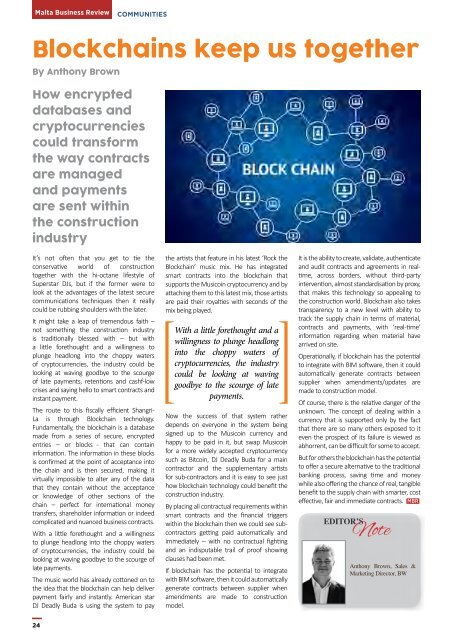Create successful ePaper yourself
Turn your PDF publications into a flip-book with our unique Google optimized e-Paper software.
Malta Business Review<br />
COMMUNITIES<br />
Malta Business Review<br />
Blockchains keep us together<br />
By Anthony Brown<br />
J.M. Vassallo Vibro Steel Ltd<br />
Mdina Road, Zebbug, ZBG 9019, Malta www.jmvibro.com sales@jmvibro.com 2146 7421<br />
How encrypted<br />
databases and<br />
cryptocurrencies<br />
could transform<br />
the way contracts<br />
are managed<br />
and payments<br />
are sent within<br />
the construction<br />
industry<br />
It’s not often that you get to tie the<br />
conservative world of construction<br />
together with the hi-octane lifestyle of<br />
Superstar DJs, but if the former were to<br />
look at the advantages of the latest secure<br />
communications techniques then it really<br />
could be rubbing shoulders with the later.<br />
It might take a leap of tremendous faith –<br />
not something the construction industry<br />
is traditionally blessed with – but with<br />
a little forethought and a willingness to<br />
plunge headlong into the choppy waters<br />
of cryptocurrencies, the industry could be<br />
looking at waving goodbye to the scourge<br />
of late payments, retentions and cashf-low<br />
crises and saying hello to smart contracts and<br />
instant payment.<br />
The route to this fiscally efficient Shangri-<br />
La is through Blockchain technology.<br />
Fundamentally, the blockchain is a database<br />
made from a series of secure, encrypted<br />
entries – or blocks - that can contain<br />
information. The information in these blocks<br />
is confirmed at the point of acceptance into<br />
the chain and is then secured, making it<br />
virtually impossible to alter any of the data<br />
that they contain without the acceptance<br />
or knowledge of other sections of the<br />
chain – perfect for international money<br />
transfers, shareholder information or indeed<br />
complicated and nuanced business contracts.<br />
With a little forethought and a willingness<br />
to plunge headlong into the choppy waters<br />
of cryptocurrencies, the industry could be<br />
looking at waving goodbye to the scourge of<br />
late payments.<br />
The music world has already cottoned on to<br />
the idea that the blockchain can help deliver<br />
payment fairly and instantly. American star<br />
DJ Deadly Buda is using the system to pay<br />
the artists that feature in his latest ‘Rock the<br />
Blockchain’ music mix. He has integrated<br />
smart contracts into the blockchain that<br />
supports the Musicoin cryptocurrency and by<br />
attaching them to this latest mix, those artists<br />
are paid their royalties with seconds of the<br />
mix being played.<br />
With a little forethought and a<br />
willingness to plunge headlong<br />
into the choppy waters of<br />
cryptocurrencies, the industry<br />
could be looking at waving<br />
goodbye to the scourge of late<br />
payments.<br />
Now the success of that system rather<br />
depends on everyone in the system being<br />
signed up to the Musicoin currency and<br />
happy to be paid in it, but swap Musicoin<br />
for a more widely accepted cryptocurrency<br />
such as Bitcoin, DJ Deadly Buda for a main<br />
contractor and the supplementary artists<br />
for sub-contractors and it is easy to see just<br />
how blockchain technology could benefit the<br />
construction industry.<br />
By placing all contractual requirements within<br />
smart contracts and the financial triggers<br />
within the blockchain then we could see subcontractors<br />
getting paid automatically and<br />
immediately – with no contractual fighting<br />
and an indisputable trail of proof showing<br />
clauses had been met.<br />
If blockchain has the potential to integrate<br />
with BIM software, then it could automatically<br />
generate contracts between supplier when<br />
amendments are made to construction<br />
model.<br />
It is the ability to create, validate, authenticate<br />
and audit contracts and agreements in realtime,<br />
across borders, without third-party<br />
intervention, almost standardisation by proxy,<br />
that makes this technology so appealing to<br />
the construction world. Blockchain also takes<br />
transparency to a new level with ability to<br />
track the supply chain in terms of material,<br />
contracts and payments, with ‘real-time’<br />
information regarding when material have<br />
arrived on site.<br />
Operationally, if blockchain has the potential<br />
to integrate with BIM software, then it could<br />
automatically generate contracts between<br />
supplier when amendments/updates are<br />
made to construction model.<br />
Of course, there is the relative danger of the<br />
unknown. The concept of dealing within a<br />
currency that is supported only by the fact<br />
that there are so many others exposed to it<br />
even the prospect of its failure is viewed as<br />
abhorrent, can be difficult for some to accept.<br />
But for others the blockchain has the potential<br />
to offer a secure alternative to the traditional<br />
banking process, saving time and money<br />
while also offering the chance of real, tangible<br />
benefit to the supply chain with smarter, cost<br />
effective, fair and immediate contracts. <strong>MBR</strong><br />
EDITOR’S<br />
Note<br />
Anthony Brown, Sales &<br />
Marketing Director, BW<br />
Green products for structural strengthening<br />
KERAKOLL.<br />
Products and services<br />
to build healthy homes<br />
that are kind to the<br />
environment.<br />
INNOVATIVE<br />
ECO-FRIENDLY<br />
RECYCLABLE<br />
HEALTHY<br />
24 25<br />
www.maltabusinessreview.net

















